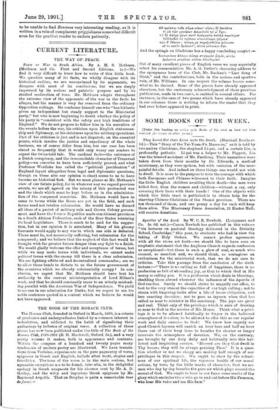THE BOOK OF THE HORACE CLUB.
The Horace Club, founded in Oxford in March, 1893, is a coterie of graduates and undergraduates linked by a common interest in beiles.lettres, and addicted to the habit of signalising their gatherings by tributes of original verse. A collection of these pieces has now been published under the title of The Book of the Horace Club, 1895-1901 (B. H. Blackwell, Oxford, 5s.), and a very pretty volume it makes, both in appearance and contents. Within the compass of a hundred and twenty pages many tendencies of modern poetry are illustrated. We have transla- tions from Verlaine, experiments in the pure pageantry of verse, epigrams in Greek and English, ballads after Scott, elegies and frivolities. The tone of the verse is in the main serious, but agreeable exceptions are to be found, inter cilia, in the delightful apology in Greek anapaests for his absence sent by Mr. A. D. Godley, and the witty and ingenious Greek epigrams by Mr. Raymond Asquith. That on Dreyfus is quite a remarkable tour 4e force:— 01 KpinrreL •ras crijga vIscvse siacts II dasshera si pi 'FLY' isawcipwv yi txsi. 51 imtrpp o:on, work srpciwarra srol■Xie srapicsxor Oinroads Te Tpliross 740v5 wilis I' teavos, ; Tarps/ Fe wapottaiteiacs anivesas oG Ts icatcJv Was laTOSKOS tee.
And the epitaph on Gladstone has a happy concluding couplet :•- aotOtomenms trAhass Ainras frrtryspby Cirydv, aiPrJs apilssros issyciAny KeisTat ?Aeuespinv.
Out of many excellent pieces of English verse we may especially select for commendation Mr. A. G. Butler's charming address to the eponymous hero of the Club, Mr. Buchan's "Last Song of Oisin," and the contributions, both in the serious and sportive vein, of Mr. Williams. In one respect the volume leaves some what to be desired. Some of the pieces have already appeared elsewhere, but the customary acknowledgment of their previous publication, made in two cases, is omitted in several others. For instance, in the case of two poems which have already appeared in our columns there is nothing to inform the reader that they had ever before appeared in print.




















































 Previous page
Previous page